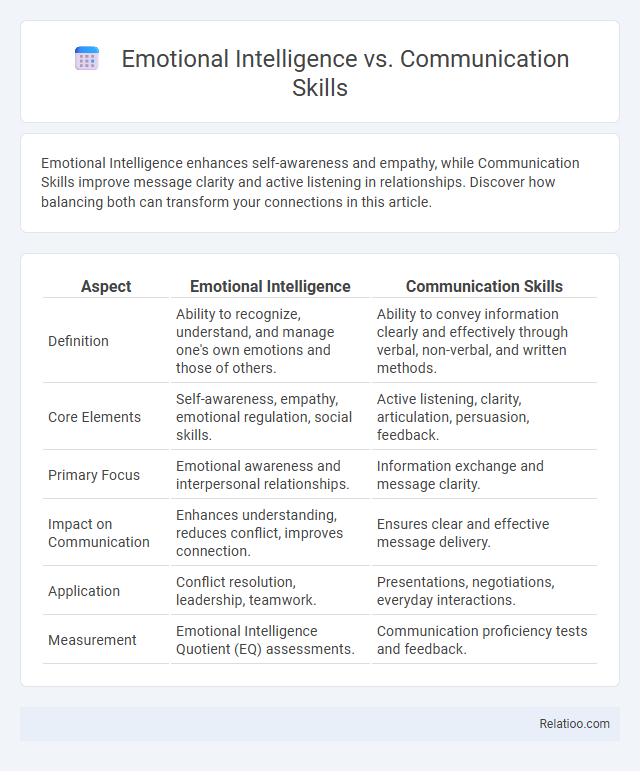Emotional Intelligence enhances self-awareness and empathy, while Communication Skills improve message clarity and active listening in relationships. Discover how balancing both can transform your connections in this article.
Table of Comparison
| Aspect | Emotional Intelligence | Communication Skills |
|---|---|---|
| Definition | Ability to recognize, understand, and manage one's own emotions and those of others. | Ability to convey information clearly and effectively through verbal, non-verbal, and written methods. |
| Core Elements | Self-awareness, empathy, emotional regulation, social skills. | Active listening, clarity, articulation, persuasion, feedback. |
| Primary Focus | Emotional awareness and interpersonal relationships. | Information exchange and message clarity. |
| Impact on Communication | Enhances understanding, reduces conflict, improves connection. | Ensures clear and effective message delivery. |
| Application | Conflict resolution, leadership, teamwork. | Presentations, negotiations, everyday interactions. |
| Measurement | Emotional Intelligence Quotient (EQ) assessments. | Communication proficiency tests and feedback. |
Understanding Emotional Intelligence
Understanding Emotional Intelligence involves recognizing and managing one's own emotions while accurately perceiving the emotions of others to foster effective interpersonal relationships. Unlike communication skills, which primarily center on the clear exchange of information, emotional intelligence emphasizes empathy, emotional regulation, and social awareness as key components. Mastery of emotional intelligence enhances communication skills by enabling individuals to respond thoughtfully to emotional cues and build deeper connections.
Defining Communication Skills
Communication skills encompass the ability to effectively convey and interpret messages through verbal, nonverbal, and written forms, ensuring clarity and understanding in interactions. Emotional intelligence involves recognizing, understanding, and managing your own emotions and those of others to foster empathy and strong relationships. Mastering communication skills enhances your capacity to express emotions appropriately, making emotional intelligence more impactful in personal and professional settings.
Key Components of Emotional Intelligence
Emotional intelligence encompasses self-awareness, self-regulation, motivation, empathy, and social skills, which are essential for recognizing and managing emotions effectively. Communication skills involve verbal and non-verbal techniques used to convey messages clearly and build understanding between individuals. While communication skills focus on message delivery, emotional intelligence enhances interpersonal interactions by fostering empathy and emotional management, leading to stronger relationships and conflict resolution.
Core Elements of Effective Communication
Emotional intelligence encompasses self-awareness, empathy, and emotional regulation, which are essential core elements of effective communication. Developing strong communication skills involves not only conveying clear messages but also actively listening and interpreting non-verbal cues driven by emotional insight. Your ability to integrate emotional intelligence with communication techniques enhances relationship-building and conflict resolution in personal and professional settings.
Emotional Intelligence vs Communication Skills: Key Differences
Emotional Intelligence (EI) involves recognizing, understanding, and managing your own emotions and those of others, which enhances empathy and interpersonal relationships. Communication Skills focus on effectively conveying information through verbal, non-verbal, and written methods to ensure clarity and understanding. The key differences lie in EI's emphasis on emotional awareness and regulation, while Communication Skills prioritize message delivery and reception accuracy.
How Emotional Intelligence Enhances Communication
Emotional intelligence enhances communication by enabling individuals to recognize and manage their own emotions while empathizing with others' feelings, leading to more effective interpersonal interactions. This skill facilitates active listening, reduces misunderstandings, and fosters trust, which is essential for clear and impactful communication. Mastery of emotional intelligence transforms communication skills by aligning emotional awareness with verbal and nonverbal messaging to create meaningful connections.
The Role of Communication in Emotional Intelligence
Effective communication is a core component of emotional intelligence, enabling you to accurately perceive, understand, and express emotions in interpersonal interactions. Strong communication skills enhance emotional intelligence by fostering empathy, active listening, and clear expression, which are essential for managing emotions and building trust. Mastering the role of communication in emotional intelligence improves your ability to resolve conflicts, collaborate, and maintain positive relationships in both personal and professional settings.
Developing Emotional Intelligence for Better Communication
Developing emotional intelligence enhances communication skills by enabling individuals to recognize and manage their own emotions while empathizing with others, leading to clearer and more effective interactions. Emotional intelligence involves self-awareness, self-regulation, motivation, empathy, and social skills, which are critical for active listening and responding appropriately in conversations. Improving emotional intelligence supports conflict resolution, reduces misunderstandings, and fosters stronger interpersonal relationships in both personal and professional settings.
Common Challenges in Balancing Both Skills
Balancing emotional intelligence and communication skills presents common challenges such as managing self-awareness while effectively conveying messages and interpreting others' emotions without miscommunication. Your ability to empathize can sometimes conflict with assertive communication, leading to misunderstandings or emotional overload. Developing both skills requires continuous practice in active listening, emotional regulation, and adapting communication styles to different contexts.
Integrating Emotional Intelligence and Communication for Success
Integrating emotional intelligence and communication skills enhances your ability to navigate interpersonal relationships effectively by recognizing and managing your emotions while interpreting others' feelings. This synergy fosters clearer, more empathetic exchanges, which improves collaboration and conflict resolution in both personal and professional settings. Mastering these combined skills drives greater success by promoting understanding, trust, and influence in your interactions.

Infographic: Emotional Intelligence vs Communication Skills
 relatioo.com
relatioo.com